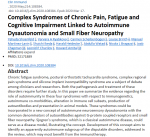Cort
Phoenix Rising Founder
- Messages
- 7,390
Just did a blog on this - it was prompted by two media articles - which described the many different symptoms that SFPN can cause. I was a bit surprised. Oaklander, though, clearly thinks that much of FM is SFPN.
https://www.healthrising.org/blog/2...me-small-fiber-polyneuropathy/#comment-980379
As I was writing the blog, two SFPN more papers popped up - one talked about a new concept of "in a new concept of autoimmune neurosensory dysautonomia". The other which argues that SFPN is behind the exercise problems in ME/CFS (!).
These papers are taking SFPN far beyond what most neurologists think it can do. Time will tell. For me, I like the hypothesis...
Complex Syndromes of Chronic Pain, Fatigue and Cognitive Impairment Linked to Autoimmune Dysautonomia and Small Fiber Neuropathy
Yehuda Shoenfeld 1, Varvara A Ryabkova 2, Carmen Scheibenbogen 3, Louise Brinth 4, Manuel Martinez-Lavin 5, Shuichi Ikeda 6, Harald Heidecke 7, Abdulla Watad 8, Nicola L Bragazzi 9, Joab Chapman 10, Leonid P Churilov 2, Howard Amital 10
Affiliations expand
Chronic fatigue syndrome, postural orthostatic tachycardia syndrome, complex regional pain syndrome and silicone implant incompatibility syndrome are a subject of debate among clinicians and researchers. Both the pathogenesis and treatment of these disorders require further study. In this paper we summarize the evidence regarding the role of autoimmunity in these four syndromes with respect to immunogenetics, autoimmune co-morbidities, alteration in immune cell subsets, production of autoantibodies and presentation in animal models.
These syndromes could be incorporated in a new concept of autoimmune neurosensory dysautonomia with the common denominators of autoantibodies against G-protein coupled receptors and small fiber neuropathy. Sjogren's syndrome, which is a classical autoimmune disease, could serve as a disease model, illustrating the concept. Development of this concept aims to identify an apparently autoimmune subgroup of the disputable disorders, addressed in the review, which may most benefit from the immunotherapy.

https://www.healthrising.org/blog/2...me-small-fiber-polyneuropathy/#comment-980379
As I was writing the blog, two SFPN more papers popped up - one talked about a new concept of "in a new concept of autoimmune neurosensory dysautonomia". The other which argues that SFPN is behind the exercise problems in ME/CFS (!).
These papers are taking SFPN far beyond what most neurologists think it can do. Time will tell. For me, I like the hypothesis...
Complex Syndromes of Chronic Pain, Fatigue and Cognitive Impairment Linked to Autoimmune Dysautonomia and Small Fiber Neuropathy
Yehuda Shoenfeld 1, Varvara A Ryabkova 2, Carmen Scheibenbogen 3, Louise Brinth 4, Manuel Martinez-Lavin 5, Shuichi Ikeda 6, Harald Heidecke 7, Abdulla Watad 8, Nicola L Bragazzi 9, Joab Chapman 10, Leonid P Churilov 2, Howard Amital 10
Affiliations expand
- PMID: 32171889
- DOI: 10.1016/j.clim.2020.108384
Chronic fatigue syndrome, postural orthostatic tachycardia syndrome, complex regional pain syndrome and silicone implant incompatibility syndrome are a subject of debate among clinicians and researchers. Both the pathogenesis and treatment of these disorders require further study. In this paper we summarize the evidence regarding the role of autoimmunity in these four syndromes with respect to immunogenetics, autoimmune co-morbidities, alteration in immune cell subsets, production of autoantibodies and presentation in animal models.
These syndromes could be incorporated in a new concept of autoimmune neurosensory dysautonomia with the common denominators of autoantibodies against G-protein coupled receptors and small fiber neuropathy. Sjogren's syndrome, which is a classical autoimmune disease, could serve as a disease model, illustrating the concept. Development of this concept aims to identify an apparently autoimmune subgroup of the disputable disorders, addressed in the review, which may most benefit from the immunotherapy.

